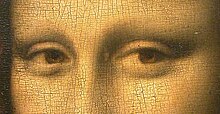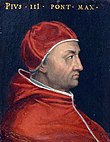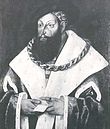This is an old revision of this page, as edited by 2603:8080:600:ad52:81b3:9614:16f0:5789 (talk) at 02:10, 31 July 2021. The present address (URL) is a permanent link to this revision, which may differ significantly from the current revision.
Revision as of 02:10, 31 July 2021 by 2603:8080:600:ad52:81b3:9614:16f0:5789 (talk)(diff) ← Previous revision | Latest revision (diff) | Newer revision → (diff)| This article needs additional citations for verification. Please help improve this article by adding citations to reliable sources. Unsourced material may be challenged and removed. Find sources: "1503" – news · newspapers · books · scholar · JSTOR (March 2015) (Learn how and when to remove this message) |
This article is about the year 1503. For the computer game, see Anno 1503. Calendar year
| Millennium: | 2nd millennium |
|---|---|
| Centuries: | |
| Decades: | |
| Years: |
| 1503 by topic |
|---|
| Arts and science |
| Leaders |
| Birth and death categories |
| Births – Deaths |
| Establishments and disestablishments categories |
| Establishments – Disestablishments |
| Works category |
| Gregorian calendar | 1503 MDIII |
| Ab urbe condita | 2256 |
| Armenian calendar | 952 ԹՎ ՋԾԲ |
| Assyrian calendar | 6253 |
| Balinese saka calendar | 1424–1425 |
| Bengali calendar | 909–910 |
| Berber calendar | 2453 |
| English Regnal year | 18 Hen. 7 – 19 Hen. 7 |
| Buddhist calendar | 2047 |
| Burmese calendar | 865 |
| Byzantine calendar | 7011–7012 |
| Chinese calendar | 壬戌年 (Water Dog) 4200 or 3993 — to — 癸亥年 (Water Pig) 4201 or 3994 |
| Coptic calendar | 1219–1220 |
| Discordian calendar | 2669 |
| Ethiopian calendar | 1495–1496 |
| Hebrew calendar | 5263–5264 |
| Hindu calendars | |
| - Vikram Samvat | 1559–1560 |
| - Shaka Samvat | 1424–1425 |
| - Kali Yuga | 4603–4604 |
| Holocene calendar | 11503 |
| Igbo calendar | 503–504 |
| Iranian calendar | 881–882 |
| Islamic calendar | 908–909 |
| Japanese calendar | Bunki 3 (文亀3年) |
| Javanese calendar | 1420–1421 |
| Julian calendar | 1503 MDIII |
| Korean calendar | 3836 |
| Minguo calendar | 409 before ROC 民前409年 |
| Nanakshahi calendar | 35 |
| Thai solar calendar | 2045–2046 |
| Tibetan calendar | 阳水狗年 (male Water-Dog) 1629 or 1248 or 476 — to — 阴水猪年 (female Water-Pig) 1630 or 1249 or 477 |

Year 1503 (MDIII) was a common year starting on Sunday (link will display the full calendar) of the Julian calendar.
Events

January–June
- January 20 – Seville in Castile is awarded exclusive rights to trade with the New World.
- January 24 – Construction of the Henry VII Chapel at Westminster Abbey begins in the perpendicular style, the final stage of English Gothic art.
- February 13 – Challenge of Barletta: Thirteen Italian knights defeat thirteen French knights, near Barletta.
- February 23 – French–Spanish Wars in Italy – Battle of Ruvo: The Spanish defeat the French.
- April 21 – Battle of Seminara: Spanish forces under Fernando de Andrade de las Mariñas defeat the French under Bernard Stewart, 4th Lord of Aubigny.
- April 21 – Battle of Cerignola: Spanish forces under Gonzalo Fernández de Córdoba defeat the French under Louis d'Armagnac, Duke of Nemours, who is killed (considered to be the first battle in history won by gunpowder small arms).
- May 10 – Christopher Columbus discovers the Cayman Islands, which he names Las Tortugas, after the numerous sea turtles there.
- May 13 – Naples is captured by the Spanish.
- May 20 (Feast of the Ascension) – Ascension Island is first definitively sighted, by Portuguese admiral Afonso de Albuquerque.
- May 28 James IV of Scotland and Margaret Tudor are married as per the Treaty of Perpetual Peace by Pope Alexander VI, according to Papal bull.
July–December
- July 23 – Orbital calculations suggest that on this day, Pluto moves outside Neptune's orbit, remaining there for 233 years.
- July 30 – Saint Helena is first definitively sighted, by ships of Portuguese navigator Estêvão da Gama returning from the East.
- August 8 – King James IV of Scotland marries Margaret Tudor, daughter of King Henry VII of England, at Holyrood Abbey, Edinburgh, Scotland.
- August 20 – Stephen III of Moldavia concludes a treaty with Sultan Bayezid II, preserving Moldavia's self-rule at the cost of an annual tribute to the Ottoman Empire.
- September 22 – Pope Pius III (Francesco Todeschini Piccolomini) succeeds Alexander VI as the 215th pope, but dies on October 18.
- October 30 – Queen Isabella I of Spain prohibits violence against indigenous peoples in the New World.
- October 31 – Pope Julius II succeeds Pius III, as the 216th pope (some sources list November 1 as the date of election).
- December 29 – Battle of Garigliano, near Gaeta, Italy: Spanish forces under Gonzalo Fernández de Córdoba defeat a French–Italian mercenary army under Ludovico II, Marquess of Saluzzo; the French forces withdraw to Gaeta.
January-February
- Vasco da Gama establishes India's first Portuguese fortress, at Cochin.
- Mariotto Albertinelli paints The Visitation.
- Hieronymus Bosch works on the triptych The Garden of Earthly Delights.
- Leonardo da Vinci probably starts work on painting the Mona Lisa in Florence.
- The book The Imitation of Christ by Thomas à Kempis is re-published in an English translation.
- The pocket handkerchief comes into general use in polite European society.
- From this year until 1650, sixteen million kilograms of silver and 185,000 kilograms of gold will enter the port of Seville.
Births


- January 3 – Al-Mutahhar, Imam of the Zaidi state of Yemen (d. 1572)
- January 11 – Parmigianino (Girolamo Francesco Maria Mazzola), Italian artist (d. 1540)
- January 18 – Joachim of Münsterberg-Oels, Duke of Münsterberg, Duke of Oels, Count of Kladsko, Bishop of Brandenburg (d. 1562)
- February 11 – Elizabeth of York, queen consort of Henry VII of England; Elizabeth dies on her 37th birthday, more than a week after giving birth to her daughter Katherine Tudor, who died the previous day.
- February 24 – Johann Gropper, German Catholic cardinal (d. 1559)
- March 4 – Elisabeth of Hesse, Countess Palatine of Zweibrücken, later Countess Palatine of Simmern (d. 1563)
- March 10 – Ferdinand I, Holy Roman Emperor (d. 1564)
- March 11 – George Harper, English politician (d. 1558)
- March 22 – Antonio Francesco Grazzini, Italian writer (d. 1584)
- April 6 – Jacob Micyllus, German humanist (d. 1558)
- April 18 – Henry II of Navarre, King of Navarre (1517–1555) (d. 1555)
- May 1 – Celio Secondo Curione, Italian humanist (d. 1569)
- June 1 – Wilhelm von Grumbach, German adventurer (d. 1567)
- June 28 – Giovanni della Casa, Italian poet (d. 1556)
- June 30 – John Frederick I, Elector of Saxony (d. 1554)
- July 23 – Anne of Bohemia and Hungary, Queen consort of the Romans, Bohemia and Hungary (d. 1547)
- August 12 – Christian III of Denmark and Norway (d. 1559)
- October 4 – Isabella of Portugal, Queen of Spain (d. 1539)
- November 12 – Philip, Duke of Palatinate-Neuburg, German duke (d. 1548)
- November 13 – Ippolita Gonzaga, Italian nun (d. 1570)
- November 17 – Agnolo di Cosimo, Italian artist and poet (d. 1572)
- November 19 – Pier Luigi Farnese, Duke of Parma (d. 1547)
- December 14 – Michel de Nostredame, called Nostradamus, French physician and writer of Les Propheties (1555) (d. 1566)
- December 20 – Cosimo Bartoli, Italian diplomat and writer (d. 1572)
- date unknown
- Lucas David, Prussian historian (d. 1583)
- Robert Estienne, French printer (d. 1559)
- John Frith, English Protestant priest and martyr (d. 1533)
- George Boleyn, 2nd viscount Rochford, English Diplomat (d. 1536)
- Susannah Hornebolt, English artist (d. c. 1554)
- Lakandula, Lakan of Tondo (d. 1589)
- Shimazu Katsuhisa, Japanese nobleman (d. 1573)
- Tomé de Sousa, Portuguese nobleman, first general-governor of Brazil (d.1573 or 1579)
- probable – Nicholas Bourbon, French poet
Deaths




- January 20 – Ludmila of Poděbrady, Regent of the duchies of Brzeg and Oława (1488–1503) (b. 1456)
- February 11 – Elizabeth of York, queen of Henry VII of England (b. 1466)
- March 16 – Edward Story, Bishop of Carlisle and Chichester
- March 14 – Frederick Jagiellon, Primate of Poland (b. 1468)
- April 4 – Annamacharya, Indian mystic saint composer (b. 1408)
- April 7 – Sophia Palaiologina, Byzantine princess and Grand Princess of Moscow (b. 1449)
- May 20 – Lorenzo di Pierfrancesco de' Medici, Italian patron of the arts (b. 1463)
- June 2 – Clara Gonzaga, Italian noble (b. 1464)
- June 24 – Reginald Bray, British courtier (b. 1440)
- July 3 – Pierre d'Aubusson, Grand Master of the Knights of Rhodes (b. 1423)
- July 12 – Sophie of Mecklenburg, Duchess of Mecklenburg, Duchess of Saxony (b. 1481)
- July 24 – Louise of Savoy, Nun (b. 1461)
- August 12 – Anna Jagiellon, Duchess of Pomerania, Polish princess (b. 1476)
- August 18 – Pope Alexander VI (b. 1431)
- September 5 – Margaret of Hanau-Münzenberg, German noblewoman (b. 1471)
- October 10 – Peter II, Duke of Bourbon (b. 1438)
- October 18 – Pope Pius III (b. c. 1439)
- November 23
- Bona of Savoy, Duchess of Savoy (b. 1449)
- Margaret of York, Duchess consort of Burgundy, spouse of Charles I, Duke of Burgundy (b. 1446)
- December 1 – George, Duke of Bavaria (b. 1455)
- December 14 – Sten Sture the Elder, regent of Sweden (1470–1497 and 1501–1503) (b. 1440)
- December 28 – Piero di Lorenzo de' Medici, exiled ruler of Florence (drowned) (b. 1472)
- date unknown
- Richard Amerike, English merchant and patron of John Cabot (b. 1445)
- Anacaona, Taino queen and poet (b. 1474)
References
- Palmer, Alan; Veronica (1992). The Chronology of British History. London: Century Ltd. pp. 137–140. ISBN 0-7126-5616-2.
- Hans Delbrück (1985). History of the art of war within the framework of political history. Greenwood Press. p. 73. ISBN 978-0-8371-6365-9.
- "Ascension History". Mysterra Magazine. Archived from the original on June 13, 2017. Retrieved December 9, 2011.
- Schulenburg, A. H. (Spring 2002). "The discovery of St Helena: the search continues". Wirebird: The Journal of the Friends of St Helena. 24: 13–19.
- Leite, Duarte (1960). História dos Descobrimentos. Vol. II. Lisbon: Edições Cosmos. p. 206.
- da Montalboddo, Fracanzio (1507). Paesi Nuovamente Retovati & Nuovo Mondo da Alberico Vesputio Fiorentino Intitulato. Venice.
- Frieda, Leonie (2013). The deadly sisterhood : a story of women, power and intrigue in the Italian Renaissance, 1427-1527 (Paperback ed.). London: Phoenix. pp. 275–276. ISBN 978-0-7538-2844-1.
- "Watercolour - Copy after The Visitation (The meeting of Mary and Elizabeth), Mariotto Albertinelli in the Uffizi (Florence)". m.vam.ac.uk. Retrieved May 6, 2018.
- Anthony Harvey; Richard Mortimer (2003). The Funeral Effigies of Westminster Abbey. Boydell Press. p. 6. ISBN 978-0-85115-879-2.
- "Ferdinand I - Holy Roman emperor". Encyclopedia Britannica. Retrieved May 6, 2018.
- Bietenholz, Peter G.; Deutscher, Thomas Brian (2003). Contemporaries of Erasmus: A Biographical Register of the Renaissance and Reformation. University of Toronto Press. p. 227. ISBN 9780802085771.
- Nostradamus (1999). Complete Prophecies of Nostradamus. Wordsworth Editions. p. 11. ISBN 978-1-84022-301-9.
- "Gregory XIV | pope". Encyclopedia Britannica. Retrieved February 11, 2020.
- Frieda, Leonie (2013). The deadly sisterhood : a story of women, power and intrigue in the Italian Renaissance, 1427-1527 (Paperback ed.). London: Phoenix. pp. 153, 266. ISBN 978-0-7538-2844-1.
- Liesangthem, Gita (July 10, 1998). "Pius III - pope". Encyclopedia Britannica. Encyclopædia Britannica, Inc. Retrieved May 6, 2018.